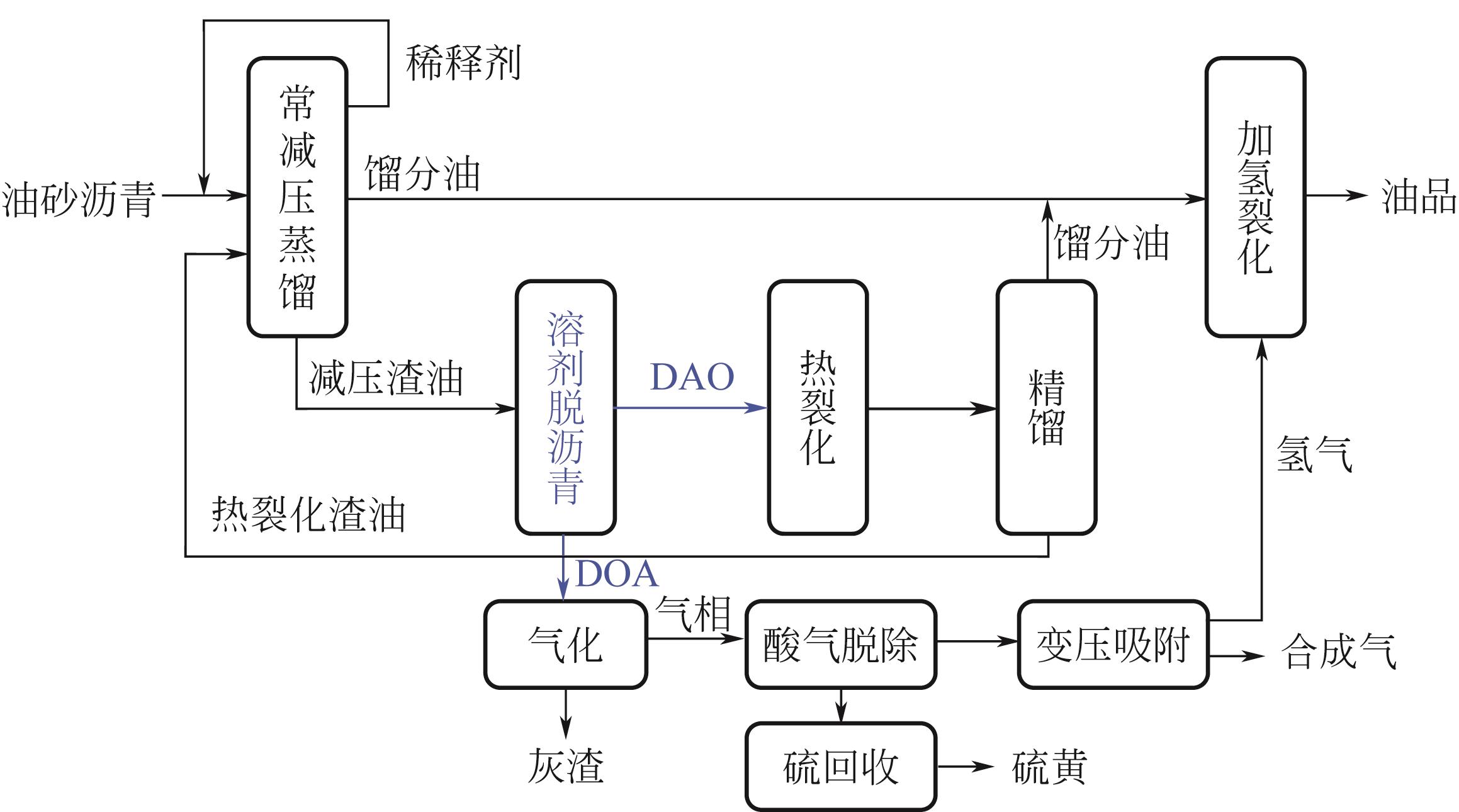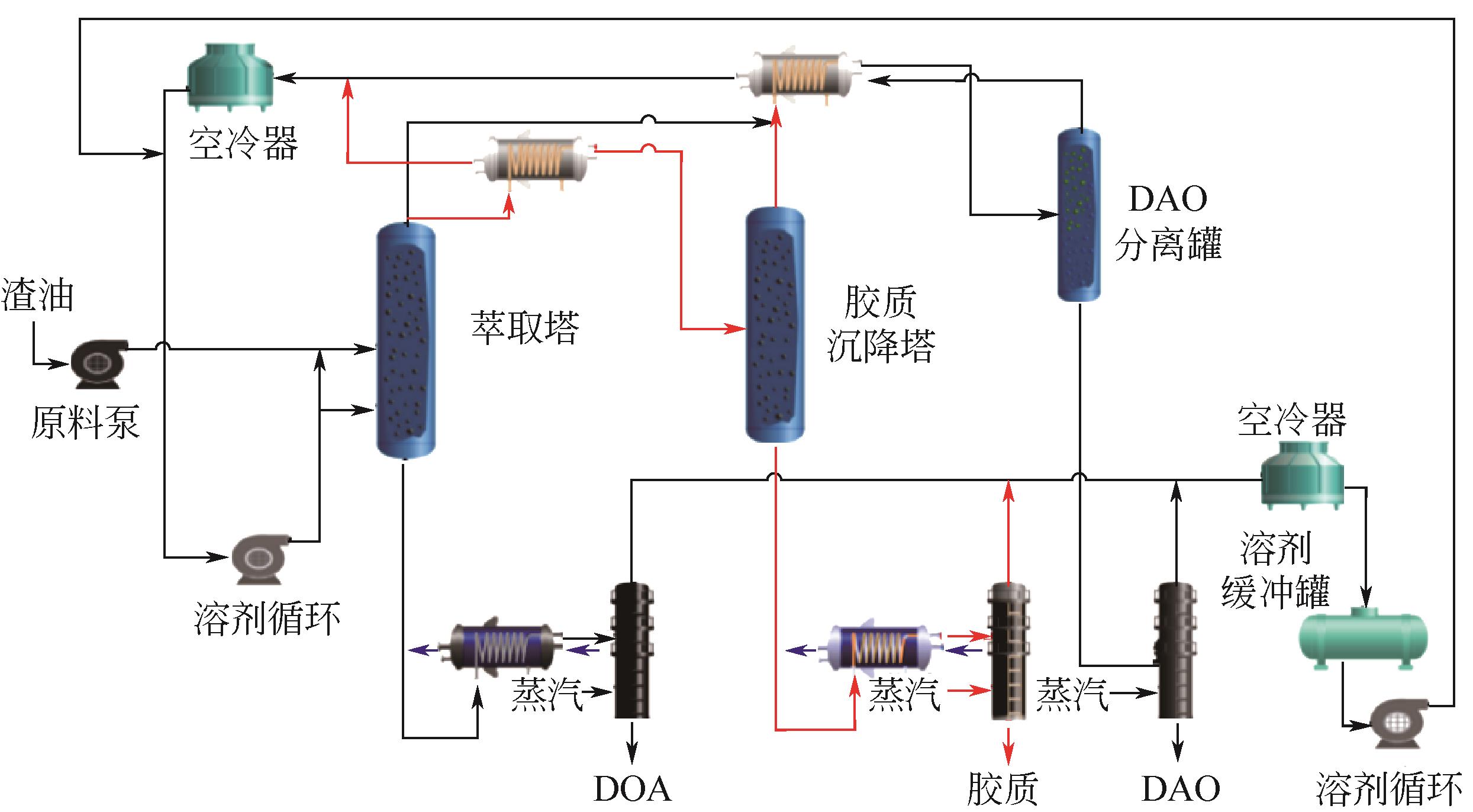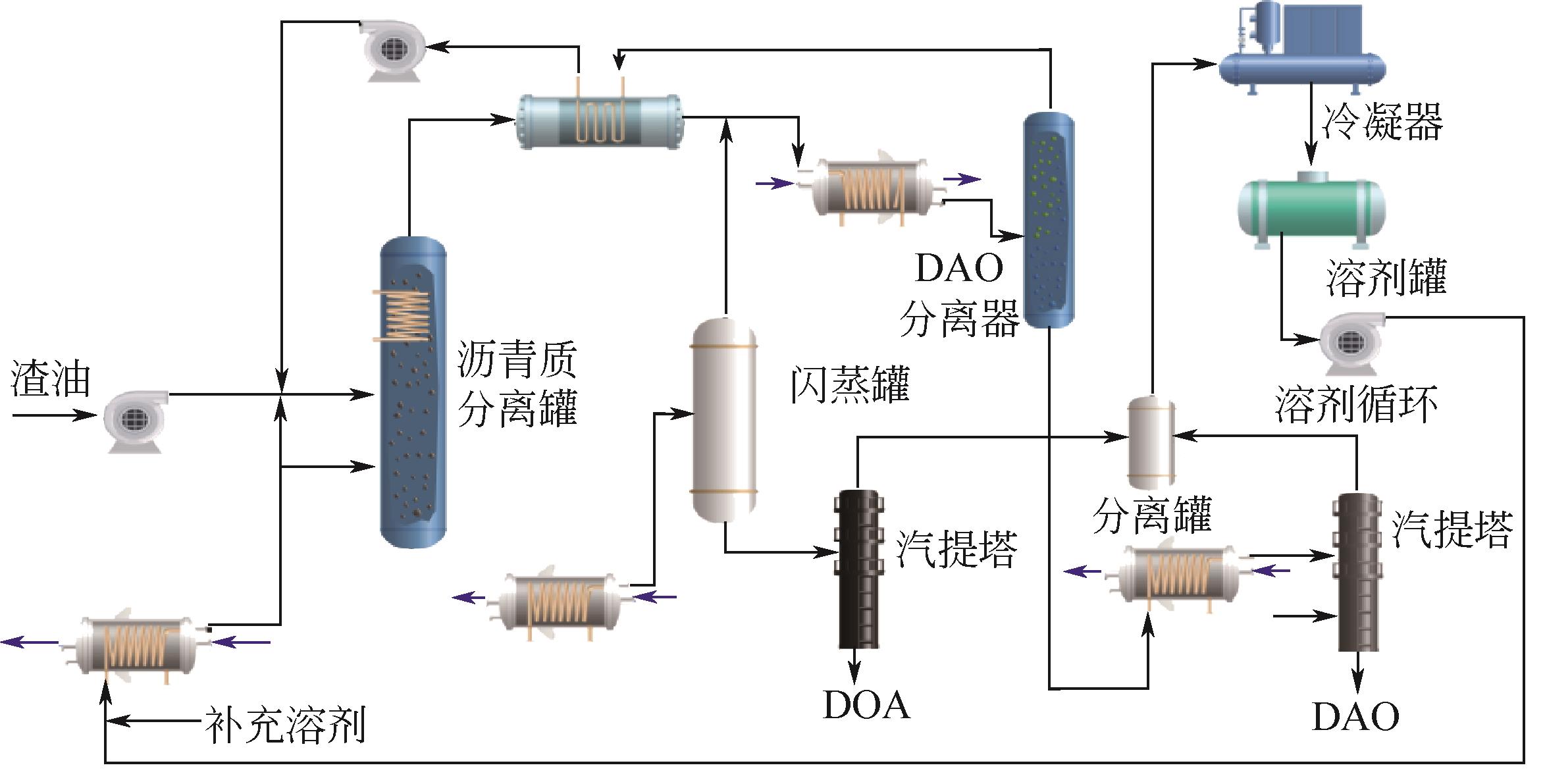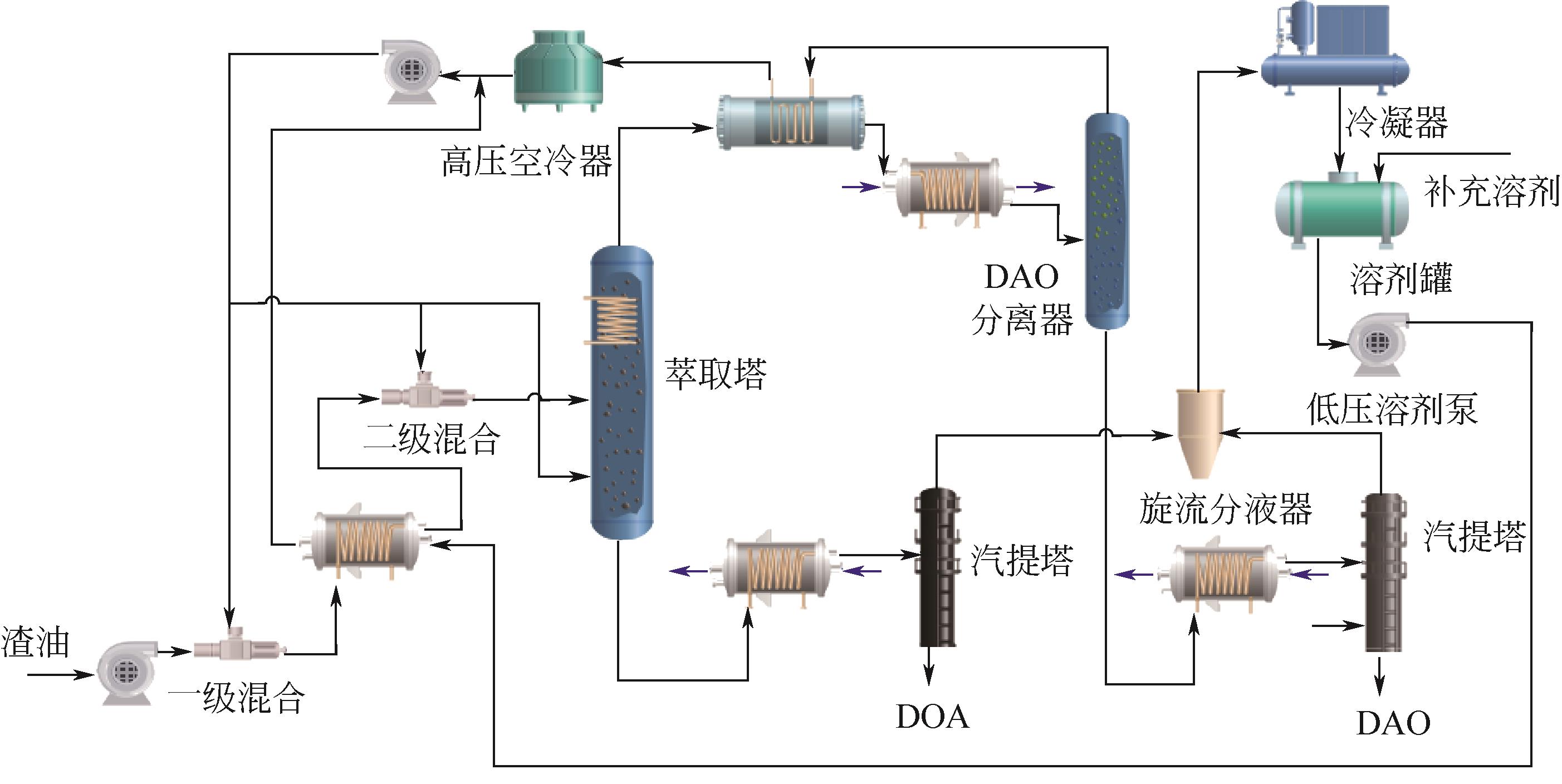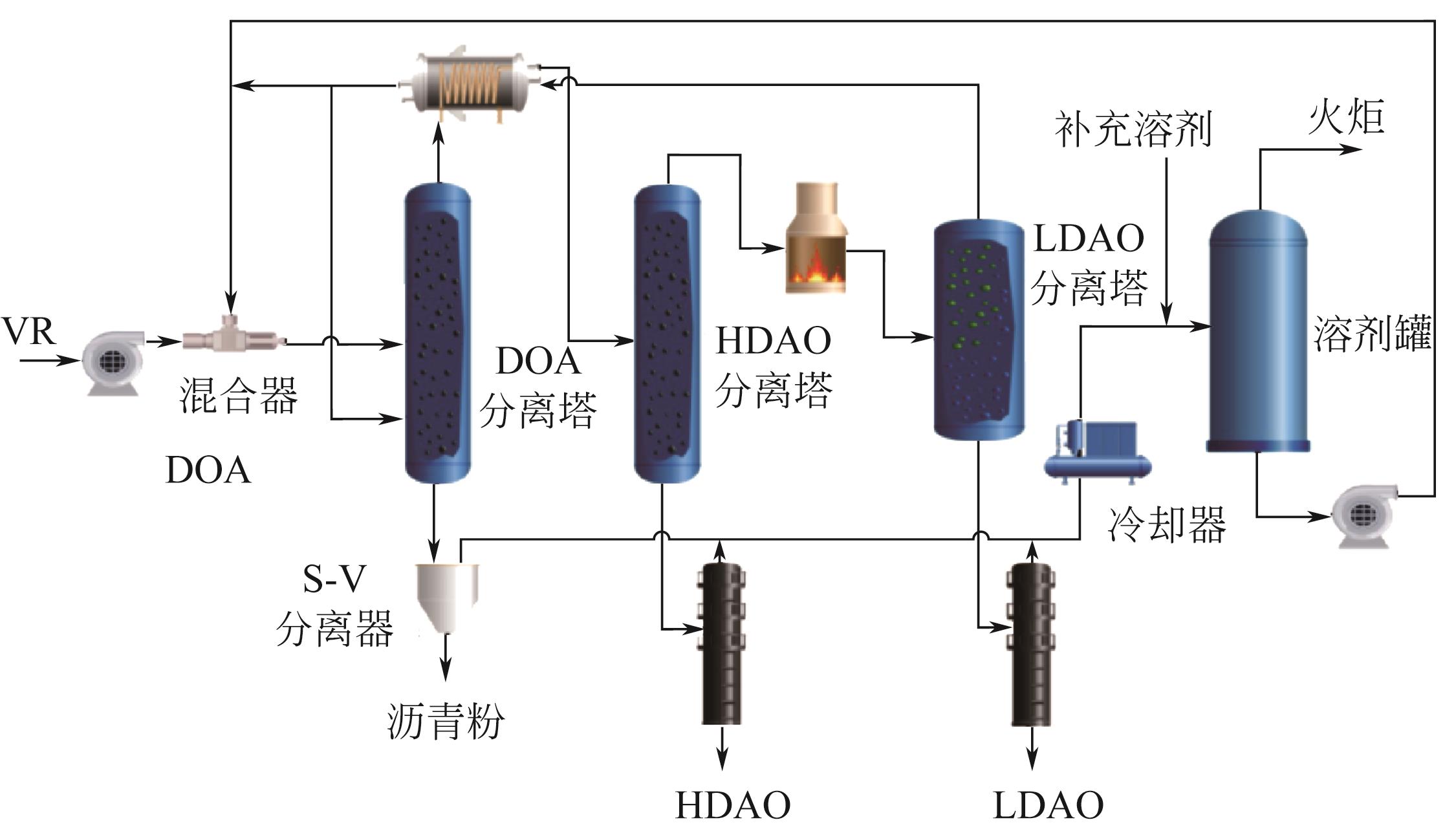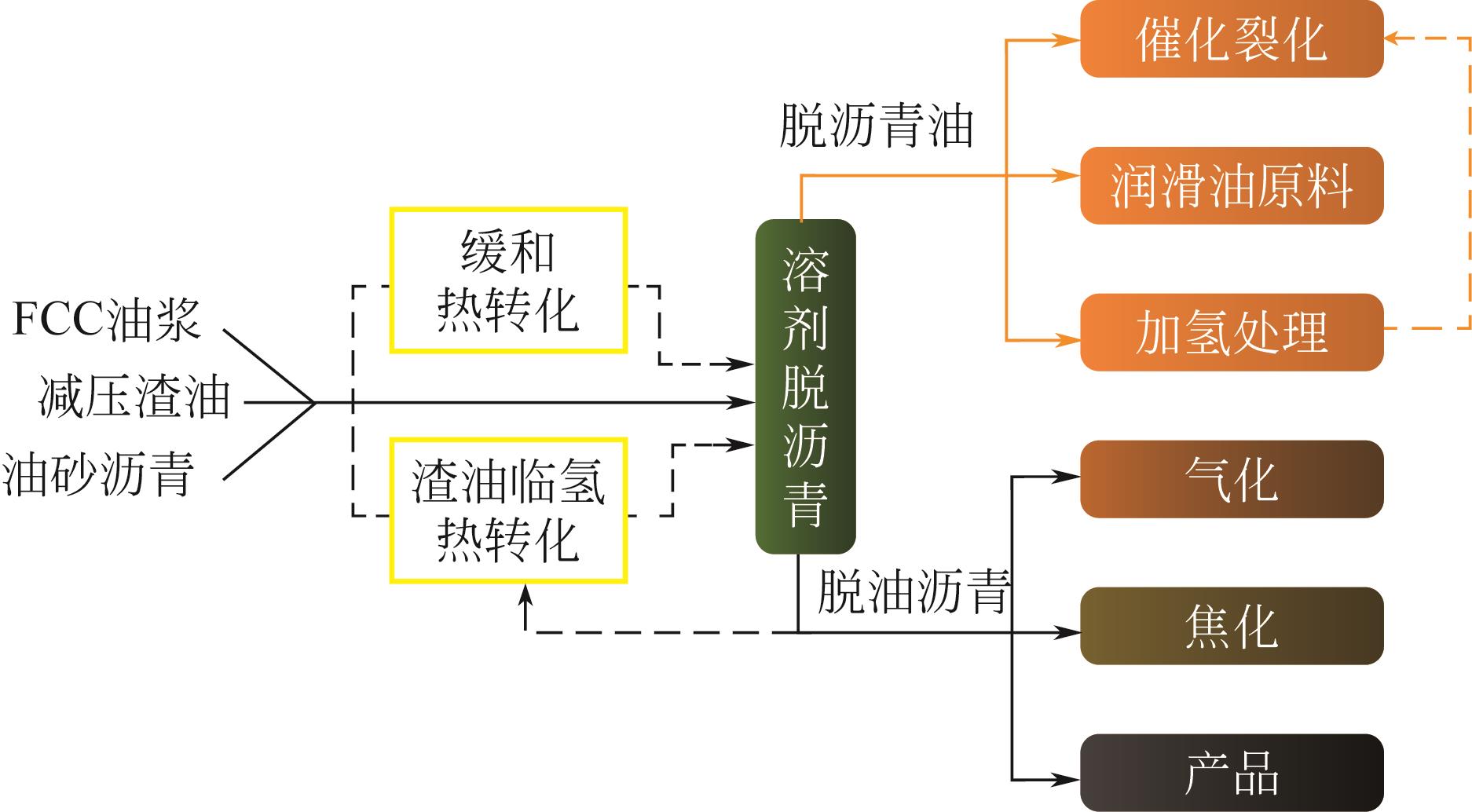Chemical Industry and Engineering Progress ›› 2023, Vol. 42 ›› Issue (9): 4573-4586.DOI: 10.16085/j.issn.1000-6613.2022-2012
• Energy processes and technology • Previous Articles Next Articles
Application and progress of solvent deasphalting technology
LIAO Zhixin( ), LUO Tao, WANG Hong, KONG Jiajun, SHEN Haiping(
), LUO Tao, WANG Hong, KONG Jiajun, SHEN Haiping( ), GUAN Cuishi, WANG Cuihong, SHE Yucheng
), GUAN Cuishi, WANG Cuihong, SHE Yucheng
- Sinopec Research Institute of Petroleum Processing Co. , Ltd. , Beijing 100083, China
-
Received:2022-10-27Revised:2022-11-18Online:2023-09-28Published:2023-09-15 -
Contact:SHEN Haiping
溶剂脱沥青技术应用与进展
廖志新( ), 罗涛, 王红, 孔佳骏, 申海平(
), 罗涛, 王红, 孔佳骏, 申海平( ), 管翠诗, 王翠红, 佘玉成
), 管翠诗, 王翠红, 佘玉成
- 中国石化石油化工科学研究院有限公司, 北京 100083
-
通讯作者:申海平 -
作者简介:廖志新(1985—),男,博士,研究方向为重油加工。E-mail:liaozhixin.ripp@sinopec.com。 -
基金资助:中国石化重点实验室课题(ST22071);中国石油化工股份有限公司课题(120047)
CLC Number:
Cite this article
LIAO Zhixin, LUO Tao, WANG Hong, KONG Jiajun, SHEN Haiping, GUAN Cuishi, WANG Cuihong, SHE Yucheng. Application and progress of solvent deasphalting technology[J]. Chemical Industry and Engineering Progress, 2023, 42(9): 4573-4586.
廖志新, 罗涛, 王红, 孔佳骏, 申海平, 管翠诗, 王翠红, 佘玉成. 溶剂脱沥青技术应用与进展[J]. 化工进展, 2023, 42(9): 4573-4586.
share this article
Add to citation manager EndNote|Ris|BibTeX
URL: https://hgjz.cip.com.cn/EN/10.16085/j.issn.1000-6613.2022-2012
| 伊拉克 | |||
| 伊拉克 | |||
| 炼厂 | 规模/ | 开工时间 | 工艺特点 |
|---|---|---|---|
| 锦西炼厂 | 20 30 | 1965年 1985年 | C3/两段/临界回收 |
| 大连七厂 | 60 | 1974年 | C3~C4混合溶剂/两段 |
| 吉化 | 20 | 1987年 | C4/一段 |
| 天津石化 | 60 | 1992年 | C4/两段 |
| 九江石化 | 50 | 2004年 | C4/一段 |
| 大榭石化 | 160 | 2022年 | C4/两段 |
| 炼厂 | 规模/ | 开工时间 | 工艺特点 |
|---|---|---|---|
| 锦西炼厂 | 20 30 | 1965年 1985年 | C3/两段/临界回收 |
| 大连七厂 | 60 | 1974年 | C3~C4混合溶剂/两段 |
| 吉化 | 20 | 1987年 | C4/一段 |
| 天津石化 | 60 | 1992年 | C4/两段 |
| 九江石化 | 50 | 2004年 | C4/一段 |
| 大榭石化 | 160 | 2022年 | C4/两段 |
| 1 | HE Lin, LIN Feng, LI Xingang, et al. Interfacial sciences in unconventional petroleum production: From fundamentals to applications[J]. Chemical Society Reviews, 2015, 44(15): 5446-5494. |
| 2 | PATIL Prafulla D, KOZMINSKI Mike, PETERSON John. Pilot plant study on continuous propane deresining of atmospheric crude cylinder stock[J]. Fuel, 2019, 235: 17-22. |
| 3 | 徐文俊. 采用组合工艺加工辽河超稠油减黏渣油的研究[D]. 北京: 中国石油大学(北京), 2020. |
| XU Wenjun. Study on the combined process in visbreaking residue refinery of Liaohe super heavy oil[D]. Beijing: China University of Petroleum (Beijing), 2020. | |
| 4 | YU Chuanbo, ZHANG Linzhou, GUO Xiuying, et al. Association model for nickel and vanadium with asphaltene during solvent deasphalting[J]. Energy & Fuels, 2015, 29(3): 1534-1542. |
| 5 | MORANTES Lina R, PERCEBOM Ana M, Enrique MEJÍA-OSPINO. On the molecular basis of aggregation and stability of Colombian asphaltenes and their subfractions[J]. Fuel, 2019, 241: 542-549. |
| 6 | MAGOMEDOV R N, PRIPAKHAILO A V, MARYUTINA T A. Effect of iron oxide nanoparticle addition on the efficiency of solvent deasphalting of oil residue with subcritical pentane[J]. Russian Journal of Physical Chemistry B, 2020, 14(7): 1098-1102. |
| 7 | DU Pingan, REN Mannian, JIANG Dan, et al. An experimental study on optimization utilization of deasphalted oil[J]. Fuel Processing Technology, 2012, 99: 64-68. |
| 8 | TONG Yujun, SHEN Benxian, FANG Weifeng, et al. Optimization of vacuum resid solvent deasphalting to produce bright stock and hard asphalt[J]. Petroleum Science and Technology, 2018, 36(1): 55-61. |
| 9 | LONG Jian, SHEN Benxian, LING Hao, et al. Novel solvent deasphalting process by vacuum residue blending with coal tar[J]. Industrial & Engineering Chemistry Research, 2011, 50(19): 11259-11269. |
| 10 | LIN Feng, XU Yuming, NELSON Richard. Pilot evaluation of an aqueous/nonaqueous hybrid bitumen extraction process for mineable oil sands[J]. Minerals Engineering, 2019, 131: 241-248. |
| 11 | 郝龙帅. 以辽河稠油减压渣油制备高芳烃环保橡胶油的研究[D]. 北京: 中国石油大学(北京), 2018. |
| HAO Longshuai. Study on the preparation of high aromatic environmental-friendly rubber oil from vacuum residue of Liaohe heavy oil[D]. Beijing: China University of Petroleum (Beijing), 2018. | |
| 12 | NICCUM Phillip K, NORTHUP Aldrich H. Processing heavy ends: Part I[J]. Petroleum Technology Quarterly, 2008, 13(4): 75-76, 79-80, 83-84. |
| 13 | HILBERT Timothy, BICOLOR Michael, VIDANKA Ajit, et al. Bright stock production from low severity residue deaspalting: JP2019504161[P]. 2019-02-14. |
| 14 | MAGOMEDOV R N, POPOVA A Z, MARYUTINA T A, et al. Current status and prospects of demetallization of heavy petroleum feedstock[J]. Petroleum Chemistry, 2015, 55(6): 423-443. |
| 15 | 崔德春, 徐庆虎, 熊亮, 等. 油砂沥青改质工艺流程优化探讨[J]. 炼油技术与工程, 2021, 51(2): 5-9. |
| CUI Dechun, XU Qinghu, XIONG Liang, et al. Discussion on process optimization of oil sands bitumen modification[J]. Petroleum Refinery Engineering, 2021, 51(2): 5-9. | |
| 16 | GRAY Murray R. Upgrading oilsands bitumen and heavy oil[M]. Edmonton: The University of Alberta Press, 2015: 449, 459. |
| 17 | SPEIGHT James G. Heavy and extra heavy oil upgrading technologies[M]. Amsterdam: Elsevier, 2013: 582-602. |
| 18 | 宁爱民, 沈本贤, 刘纪昌, 等. 常压闪蒸-溶剂脱沥青组合工艺提高塔河原油加工中液体收率的研究[J]. 石油炼制与化工, 2014, 45(11): 74-79. |
| NING Aimin, SHEN Benxian, LIU Jichang, et al. Improving liquid yield of Tahe crude by atomspheric flash-solvent deasphalting combined process[J]. Petroleum Processing and Petrochemicals, 2014, 45(11): 74-79. | |
| 19 | MOTAGHI M, SHREE K, KRISHNAMURTHY S. Consider new methods for bottom of the barrel processing-Part 2[J]. Hydrocarbon Processing, 2010, 89(3): 55-58. |
| 20 | ANAND Subramanian, 刘杰. 三产品ROSE渣油超临界溶剂脱沥青技术用来生产道路沥青或阳极焦[C]//北京: 中国石油学会石油炼制学术年会, 2010: 64-68. |
| ANAND Subramanian, LIU Jie. Three product ROSE residue supercritical solvent deasphalting technology is used to produce road asphalt or anode coke[C]//Beijing: Annual Meeting of Petroleum Refining of China Petroleum Society, 2010: 64-68. | |
| 21 | GOVINDHAJANNAN J, LEFEBVRE H G. Process and apparatus for two-stage deasphalting: US10703994[P]. 2020-07-07. |
| 22 | RAMIREZ-CORREDORES M. The science and technology of unconventional oils[M]. London: Academic Press, 2017: 502-524. |
| 23 | CASTANEDA L C, MUNOZ J A D, ANCHEYTA J. Combined process schemes for upgrading of heavy petroleum[J]. Fuel, 2012, 100: 110-127. |
| 24 | 王祖纲, 杨勇, 肖家治. 重油加工脱碳技术的发展现状与趋势[J]. 世界石油工业, 2021, 28(2): 53-62. |
| WANG Zugang, YANG Yong, XIAO Jiazhi. Development and prospect of decarburization technology in heavy oil processing[J]. World Petroleum Industry, 2021, 28(2): 53-62. | |
| 25 | 张董鑫, 李京辉, 徐鲁燕. 溶剂脱沥青技术研究进展[J]. 当代石油石化, 2018, 26(12): 34-42. |
| ZHANG Dongxin, LI Jinghui, XU Luyan. Research progress on solvent deasphalting technology[J]. Petroleum & Petrochemical Today, 2018, 26(12): 34-42. | |
| 26 | 柴志杰, 任满年. 沥青生产与应用技术问答[M]. 2版. 北京: 中国石化出版社, 2015. |
| CHAI Zhijie, REN Mannian. Questions and answers on asphalt production and application technology[M]. 2nd ed. Beijing: China Petrochemical Press, 2015. | |
| 27 | FAN Meng, SUN Xuewen, XU Zhiming, et al. Softening point: An indicator of asphalt granulation behavior in the selective asphaltene extraction (SELEX-asp) process[J]. Energy & Fuels, 2011, 25(7): 3060-3067. |
| 28 | SHI Quan, ZHAO Suoqi, ZHOU Yasong, et al. Development of heavy oil upgrading technologies in China[J]. Reviews in Chemical Engineering, 2019, 36(1): 1-19. |
| 29 | 徐春明, 赵锁奇, 卢春喜, 等. 重质油梯级分离新工艺的工程基础研究[J]. 化工学报, 2010, 61(9): 2393-2400. |
| XU Chunming, ZHAO Suoqi, LU Chunxi, et al. Engineering basics of heavy oil deep stage separating process[J]. CIESC Journal, 2010, 61(9): 2393-2400. | |
| 30 | REFA K O. Integrated process for solvent deasphalting and gas phase oxidative desulfurization of residue oil: EP3870677[P]. 2021-09-01. |
| 31 | BOURANE Abdennour, SHAFI Raheel, SAYED Essam, et al. Integrated solvent deasphalting, hydrotreating and steam pyrolysis process for direct processing of a crude oil: US9284502[P]. 2016-03-15. |
| 32 | BOURANE Abdennour, SHAFI Raheel, SAYED Essam, et al. Integrated solvent deasphalting, hydrotreating and steam pyrolysis process for direct processing of a crude oil: US13865062[P]. 2013-09-12. |
| 33 | GILLIS Daniel, VANWEES Mark, ZIMMERMAN Paul, et al. Upgrading residues to maximize distillate yields with UOP UniflexTM process[J]. Journal of the Japan Petroleum Institute, 2010, 53(1): 33-41. |
| 34 | BROWN S H, VAUGHAN G A, HANKS P L, et al. Upgrading challenged feeds and pitches produced therefrom: US16707575[P]. 2020-06-11. |
| 35 | BALDASSARI Mario C, MUKHERJEE Ujjal K, Olsen ANN-MARIE, et al. Integration of residue hydrocracking and hydrotreating: EP14775041[P]. 2016-01-20. |
| 36 | MARQUES Joao, DREILLARD Matthieu, FEUGNET Frédéric, et al. Improved method for converting residues incorporating deep hydroconversion steps and a deasphalting step: EP18814905[P]. 2020-10-28. |
| 37 | ADAMS Jeramie J. Asphaltene adsorption, a literature review[J]. Energy & Fuels, 2014, 28(5): 2831-2856. |
| 38 | HOSSEINPOUR Negahdar, MORTAZAVI Yadollah, BAHRAMIAN Alireza, et al. Enhanced pyrolysis and oxidation of asphaltenes adsorbed onto transition metal oxides nanoparticles towards advanced in situ combustion EOR processes by nanotechnology[J]. Applied Catalysis A: General, 2014, 477: 159-171. |
| 39 | FONG Shirley Y, MONTOYA SÁNCHEZ Natalia, DE KLERK Arno. Olefin saturation using asphaltenes as a hydrogen source[J]. Energy & Fuels, 2020, 34(4): 4534-4543. |
| 40 | SUN Shiyuan, MENG Fandong. Study on solvent deasphalting process for upgrading of hydrocracking unconverted oil[J]. Industrial & Engineering Chemistry Research, 2021, 60(1): 652-658. |
| 41 | RUBIN-PITEL S B, KAR K, FRUCHEY K S. Fluxed deasphalter rock fuel oil blend component oils: US15390775[P]. 2020-02-04. |
| 42 | BROWN S H, CUNNINGHAM B A, SMILEY R J, et al. Reside upgrading with reduced severity FCC processing: EP18718292[P]. 2020-02-12. |
| 43 | 蔡智. 溶剂脱沥青-脱油沥青气化-脱沥青油催化裂化组合工艺研究及应用[J]. 当代石油石化, 2007, 15(4): 16-20, 49. |
| CAI Zhi. The research and application of solvent deasphalting-deoiling asphalt gasification-deasphalting oil FCC group technology[J]. Petroleum & Petrochemical Today, 2007, 15(4): 16-20, 49. | |
| 44 | AL-GHAMDI M S, BAHAMMAM B, OSAIMI N AL, et al. Process and system for conversion of crude oil to petrochemicals and fuel products integrating solvent deasphalting of vacuum residue: US16555808[P]. 2020-04-23. |
| 45 | 袁晓云, 赵飞, 魏广春, 等. 溶剂脱沥青-催化裂化工艺的优化组合及其应用[J]. 炼油技术与工程, 2011, 41(5): 6-9. |
| YUAN Xiaoyun, ZHAO Fei, WEI Guangchun, et al. Optimized integration of solvent deasphalting-FCC process and application[J]. Petroleum Refinery Engineering, 2011, 41(5): 6-9. | |
| 46 | 孙学文, 郭秀颖. 采用组合工艺提高辽河减压渣油轻油收率[J]. 石油炼制与化工, 2015, 46(6): 12-16. |
| SUN Xuewen, GUO Xiuying. Improving light oil yield from Liaohe vaccum residue using combined processes[J]. Petroleum Processing and Petrochemicals, 2015, 46(6): 12-16. | |
| 47 | 孔海平, 赵军, 李雪同, 等. 催化裂化油浆利用新技术研究[J]. 天然气与石油, 2011, 29(3): 35-37. |
| KONG Haiping, ZHAO Jun, LI Xuetong, et al. A new technology for FCC slurry oil utilization[J]. Natural Gas and Oil, 2011, 29(3): 35-37. | |
| 48 | 张兆前, 李正, 朱根权, 等. 催化裂化油浆利用的技术进展[J]. 化工进展, 2007, 26(11): 1559-1563. |
| ZHANG Zhaoqian, LI Zheng, ZHU Genquan, et al. Technical progress of utilization of fluid catalytic cracking slurry[J]. Chemical Industry and Engineering Progress, 2007, 26(11): 1559-1563. | |
| 49 | 刘以红, 宋艳茹. 催化裂化油浆在生产优质道路沥青中的应用[J]. 石油化工高等学校学报, 2004, 17(3): 58-61, 72. |
| LIU Yihong, SONG Yanru. Production of paving asphalt by solvent deasphalting of vacuum residue and RCC decant oil[J]. Journal of Petrochemical Universities, 2004, 17(3): 58-61, 72. | |
| 50 | KENDALL Sugrach, SARA Kegreen, ANJANEA Escovali, et al. Deasphalting and gasification of integrated residual oil: JP2018533880[P]. 2020-07-08. |
| 51 | RAMACHANDRAN P P, KUMAR D S, DEVI P, et al. Process for conversion of residue employing de-asphalting and delayed coking: EP18160854[P]. 2019-02-20. |
| 52 | 胡艳芳, 秦如意. 溶剂脱沥青-延迟焦化-加氢处理组合工艺[J]. 广州化工, 2012, 40(13): 106-108. |
| HU Yanfang, QIN Ruyi. Combined process of solvent deasphalting-delayed coking-hydrotreating[J]. Guangzhou Chemical Industry, 2012, 40(13): 106-108. | |
| 53 | LEE Jung Moo, SHIN Sangcheol, Seonju AHN, et al. Separation of solvent and deasphalted oil for solvent deasphalting process[J]. Fuel Processing Technology, 2014, 119: 204-210. |
| 54 | 张翠侦, 田义斌, 王凯, 等. 中海油某减压渣油综合利用的研究[J]. 石油炼制与化工, 2018, 49(3): 85-88. |
| ZHANG Cuizhen, TIAN Yibin, WANG Kai, et al. Study on comprehensive utilization of CNOOC vacuum residue[J]. Petroleum Processing and Petrochemicals, 2018, 49(3): 85-88. | |
| 55 | 张雅琳, 张占全, 王燕, 等. 费托合成油和石油基油加工产品对比分析[J]. 化工进展, 2018, 37(10): 3781-3787. |
| ZHANG Yalin, ZHANG Zhanquan, WANG Yan, et al. Comparative analysis of products from Fischer-Tropsch oil and petroleum based oil[J]. Chemical Industry and Engineering Progress, 2018, 37(10): 3781-3787. | |
| 56 | LEE Stephen K, ROSENBAUM John M, HAO Yalin, et al. Premium lubricant base stocks by hydroprocessing[M]//Springer handbook of petroleum technology. Cham: Springer, 2017, 4728(5): 1015-1042. |
| 57 | 杜平安. 脱沥青油高效利用双向组合工艺研究[D]. 上海: 华东理工大学, 2011. |
| DU Ping’an. Combination technologies of bidirectional utilization of deasphalting oil[D]. Shanghai: East China University of Science and Technology, 2011. | |
| 58 | Mustafa AL-SABAWI, SETH Deepyaman, BRUIJN Theo De. Effect of modifiers in n-pentane on the supercritical extraction of Athabasca bitumen[J]. Fuel Processing Technology, 2011, 92(10): 1929-1938. |
| 59 | 齐万振. 辽河混合稠油减压渣油制备光亮油的研究[D]. 北京: 中国石油大学(北京), 2020. |
| QI Wanzhen. Research on the preparation of bright stock from Liaohe mixed heavy oil vacuum residue[D]. Beijing: China University of Petroleum (Beijing), 2020. | |
| 60 | 黄灏, 傅徐钢, 易发军, 等. 溶剂脱沥青工艺优化浅谈[J]. 润滑油, 2010, 25(4): 61-64. |
| HUANG Hao, FU Xugang, YI Fajun, et al. A discussion about the optimization of solvent deasphalting process[J]. Lubricating Oil, 2010, 25(4): 61-64. | |
| 61 | 于洋, 杨磊. 溶剂组成对SDA装置脱沥青油的影响[J]. 河南化工, 2020, 37(7): 32-35. |
| YU Yang, YANG Lei. Effect of solvent composition on deasphalted oil in SDA unit[J]. Henan Chemical Industry, 2020, 37(7): 32-35. | |
| 62 | GO Kang Seok, KWON Eun Hee, KIM Kwang Ho, et al. Effect of ionic surfactants on improving deasphalting selectivity in a nonpolar system[J]. Energy & Fuels, 2016, 30(3): 2076-2083. |
| 63 | MAGOMEDOV R N, PRIPAKHAYLO A V, MARYUTINA T A, et al. Role of solvent deasphalting in the modern oil refining practice and trends in the process development[J]. Russian Journal of Applied Chemistry, 2019, 92(12): 1634-1648. |
| 64 | KUMAR Rajeev, CHEBROLU Seetaram, VOOLAPALLI R K, et al. A solvent deasphalting dearomatization (SD-A2) process for heavy oil upgradation[J]. Fuel, 2022, 307: 121923. |
| 65 | MAGOMEDOV R N, PRIPAKHAILO A V, MARYUTINA T A. Effect of the phase state of the solvent on solvent deactivation of tar by n-pentane[J]. Chemistry and Technology of Fuels and Oils, 2019, 54(6): 721-732. |
| 66 | 徐庆虎, 崔德春, 纪钦洪, 等. 溶剂对油砂沥青改质溶剂脱沥青影响研究[J]. 炼油技术与工程, 2021, 51(3): 9-12. |
| XU Qinghu, CUI Dechun, JI Qinhong, et al. Influence of solvent on deasphalting unit in oil sands bitumen upgrader[J]. Petroleum Refinery Engineering, 2021, 51(3): 9-12. | |
| 67 | KOSEOGLU O R. Integrated enhanced solvent deasphalting and coking system to produce petroleum green coke: US16773351[P]. 2021-06-01. |
| 68 | LIN Feng, PANG Chongjun John. Impact of a hybrid bitumen extraction process on the destabilization of resulting bitumen froth emulsion diluted with heptane[J]. Minerals Engineering, 2020, 145: 106069. |
| 69 | NI Hongxing, HSU Chang Samuel, LEE Peter, et al. Supercritical carbon dioxide extraction of petroleum on kieselguhr[J]. Fuel, 2015, 141: 74-81. |
| 70 | LODI Leandro, CÁRDENAS CONCHA Viktor Oswaldo, MEDINA Lilian Carmen, et al. An experimental study of a pilot plant deasphalting process in CO2 supercritical[J]. Petroleum Science and Technology, 2015, 33(4): 481-486. |
| 71 | MAGOMEDOV Rustam N, PRIPAKHAYLO Artem V, MARYUTINA Tatiana A. Solvent demetallization of heavy petroleum feedstock using supercritical carbon dioxide with modifiers[J]. Journal of Supercritical Fluids, 2017, 119: 150-158. |
| 72 | HE Lin, LIN Feng, LI Xingang, et al. Effect of solvent addition on bitumen-air bubble attachment in process water[J]. Chemical Engineering Science, 2015, 137: 31-39. |
| 73 | 李飞飞, 迟春红, 王俊美. 溶剂脱沥青工艺在当今炼厂的作用及发展趋势[J]. 化学工程师, 2022, 36(3): 73-76, 72. |
| LI Feifei, CHI Chunhong, WANG Junmei. Trend in the process development and role of solvent deasphalting in refinery nowadays[J]. Chemical Engineer, 2022, 36(3): 73-76, 72. | |
| 74 | PRIPAKHAYLO A V, MAGOMEDOV R N, MARYUTINA T A. Separation of heavy oil into narrow fractions by supercritical fluid extraction using a CO2-toluene mixture[J]. Journal of Analytical Chemistry, 2019, 74(4): 401-409. |
| 75 | COSSEY Heidi L, GUIGARD Selma E, UNDERWOOD Eleisha, et al. Supercritical fluid extraction of bitumen using chemically modified carbon dioxide[J]. Journal of Supercritical Fluids, 2019, 154: 104599. |
| 76 | Soo Ik IM, SHIN Sangcheol, PARK Jun Woo, et al. Selective separation of solvent from deasphalted oil using CO2 for heavy oil upgrading process based on solvent deasphalting[J]. Chemical Engineering Journal, 2018, 331: 389-394. |
| 77 | OVALLES Cesar, ROGEL Estrella, VIEN Janie, et al. In-situ upgrading of heavy crude oils via solvent deasphalting using of nickel oxide nanoparticles as asphaltene co-precipitants[J]. Fuel, 2022, 313: 122707. |
| 78 | HOSSEINPOUR Negahdar, KHODADADI Abbas ALI, BAHRAMIAN Alireza, et al. Asphaltene adsorption onto acidic/basic metal oxide nanoparticles toward in situ upgrading of reservoir oils by nanotechnology[J]. Langmuir, 2013, 29(46): 14135-14146. |
| 79 | SUN M, ZHANG Z, SHAIKH S K. Non-solvent crude oil heavy oil stream deasphalting process: US17169014[P]. 2021-05-27. |
| 80 | HILL James, ARATO Claudio. Method of treating heavy oil: US13822818[P]. 2013-10-24. |
| 81 | ZHAO Yingxian, WEI Feng. Simultaneous removal of asphaltenes and water from water-in-bitumen emulsion: Ⅰ. Fundamental development[J]. Fuel Processing Technology, 2008, 89(10): 933-940. |
| 82 | ZHAO Yingxian, WEI Feng. Simultaneous removal of asphaltenes and water from water-in-bitumen emulsion: Ⅱ. Application feasibility[J]. Fuel Processing Technology, 2008, 89(10): 941-948. |
| 83 | 岳堃. 重油溶剂脱沥青萃取塔内件开发[D]. 北京: 北京化工大学, 2015. |
| YUE Kun. The development of solvent deasphalting extraction column internals worked with heavy oil[D]. Beijing: Beijing University of Chemical Technology, 2015. | |
| 84 | 费维扬. 萃取塔设备研究和应用的若干新进展[J]. 化工学报, 2013, 64(1): 44-51. |
| FEI Weiyang. Progresses of study and application on extraction columns[J]. CIESC Journal, 2013, 64(1): 44-51. | |
| 85 | 范召运, 蔡卫滨, 杨蕴辉, 等. 导向格栅规整填料萃取塔的操作性能[J]. 化工学报, 2015, 66(5): 1792-1797. |
| FAN Zhaoyun, CAI Weibin, YANG Yunhui, et al. Operation properties of oriented grid packing extractor[J]. CIESC Journal, 2015, 66(5): 1792-1797. | |
| 86 | 蔡卫滨, 钱建兵, 王玉军, 等. 舌形板波纹规整填料萃取塔的操作性能[J]. 高校化学工程学报, 2017, 31(2): 308-315. |
| CAI Weibin, QIAN Jianbing, WANG Yujun, et al. Operation performance of an SBW stack packed extraction column[J]. Journal of Chemical Engineering of Chinese Universities, 2017, 31(2): 308-315. | |
| 87 | 方斌. 干气密封在溶剂脱沥青装置溶剂泵中的应用[J]. 石油化工技术与经济, 2018, 34(2): 46-50. |
| FANG Bin. Application of dry gas seal in solvent pump of solvent deasphalting unit[J]. Techno-Economics in Petrochemicals, 2018, 34(2): 46-50. | |
| 88 | 陈万新. 溶剂脱沥青装置扩能改造运行情况分析[J]. 齐鲁石油化工, 2022, 50(1): 45-49. |
| CHEN Wanxin. Operation situation analysis of capacity expansion and transformation on the solvent deasphalting unit[J]. Qilu Petrochemical Technology, 2022, 50(1): 45-49. |
| [1] | CUI Shoucheng, XU Hongbo, PENG Nan. Simulation analysis of two MOFs materials for O2/He adsorption separation [J]. Chemical Industry and Engineering Progress, 2023, 42(S1): 382-390. |
| [2] | XU Jiaheng, LI Yongsheng, LUO Chunhuan, SU Qingquan. Optimization of methanol steam reforming process [J]. Chemical Industry and Engineering Progress, 2023, 42(S1): 41-46. |
| [3] | LI Shilin, HU Jingze, WANG Yilin, WANG Qingji, SHAO Lei. Research progress in separation and extraction of high value components by electrodialysis [J]. Chemical Industry and Engineering Progress, 2023, 42(S1): 420-429. |
| [4] | GUO Qiang, ZHAO Wenkai, XIAO Yonghou. Numerical simulation of enhancing fluid perturbation to improve separation of dimethyl sulfide/nitrogen via pressure swing adsorption [J]. Chemical Industry and Engineering Progress, 2023, 42(S1): 64-72. |
| [5] | YANG Jianping. PSE for feedstock consumption reduction in reaction system of HPPO plant [J]. Chemical Industry and Engineering Progress, 2023, 42(S1): 21-32. |
| [6] | HE Meijin. Application and development trend of molecular management in separation technology in petrochemical field [J]. Chemical Industry and Engineering Progress, 2023, 42(S1): 260-266. |
| [7] | CHENG Tao, CUI Ruili, SONG Junnan, ZHANG Tianqi, ZHANG Yunhe, LIANG Shijie, PU Shi. Analysis of impurity deposition and pressure drop increase mechanisms in residue hydrotreating unit [J]. Chemical Industry and Engineering Progress, 2023, 42(9): 4616-4627. |
| [8] | QIAN Sitian, PENG Wenjun, ZHANG Xianming. Comparative analysis of forming cyclic oligomers via PET melt polycondensation and cyclodepolymerization [J]. Chemical Industry and Engineering Progress, 2023, 42(9): 4808-4816. |
| [9] | SHI Tianxi, SHI Yonghui, WU Xinying, ZHANG Yihao, QIN Zhe, ZHAO Chunxia, LU Da. Effects of Fe2+ on the performance of Anammox EGSB reactor [J]. Chemical Industry and Engineering Progress, 2023, 42(9): 5003-5010. |
| [10] | CHANG Yinlong, ZHOU Qimin, WANG Qingyue, WANG Wenjun, LI Bogeng, LIU Pingwei. Research progress in high value chemical recycling of waste polyolefins [J]. Chemical Industry and Engineering Progress, 2023, 42(8): 3965-3978. |
| [11] | PAN Yichang, ZHOU Rongfei, XING Weihong. Advanced microporous membranes for efficient separation of same-carbon-number hydrocarbon mixtures: State-of-the-art and challenges [J]. Chemical Industry and Engineering Progress, 2023, 42(8): 3926-3942. |
| [12] | ZHOU Longda, ZHAO Lixin, XU Baorui, ZHANG Shuang, LIU Lin. Advances in electrostatic-cyclonic coupling enhanced multiphase media separation research [J]. Chemical Industry and Engineering Progress, 2023, 42(7): 3443-3456. |
| [13] | CHEN Xiangli, LI Qianqian, ZHANG Tian, LI Biao, LI Kangkang. Research progress on self-healing oil/water separation membranes [J]. Chemical Industry and Engineering Progress, 2023, 42(7): 3600-3610. |
| [14] | LOU Baohui, WU Xianhao, ZHANG Chi, CHEN Zhen, FENG Xiangdong. Advances in nanofluid for CO2 absorption and separation [J]. Chemical Industry and Engineering Progress, 2023, 42(7): 3802-3815. |
| [15] | GU Shiya, DONG Yachao, LIU Linlin, ZHANG Lei, ZHUANG Yu, DU Jian. Design and optimization of pipeline system for carbon capture considering intermediate nodes [J]. Chemical Industry and Engineering Progress, 2023, 42(6): 2799-2808. |
| Viewed | ||||||
|
Full text |
|
|||||
|
Abstract |
|
|||||
